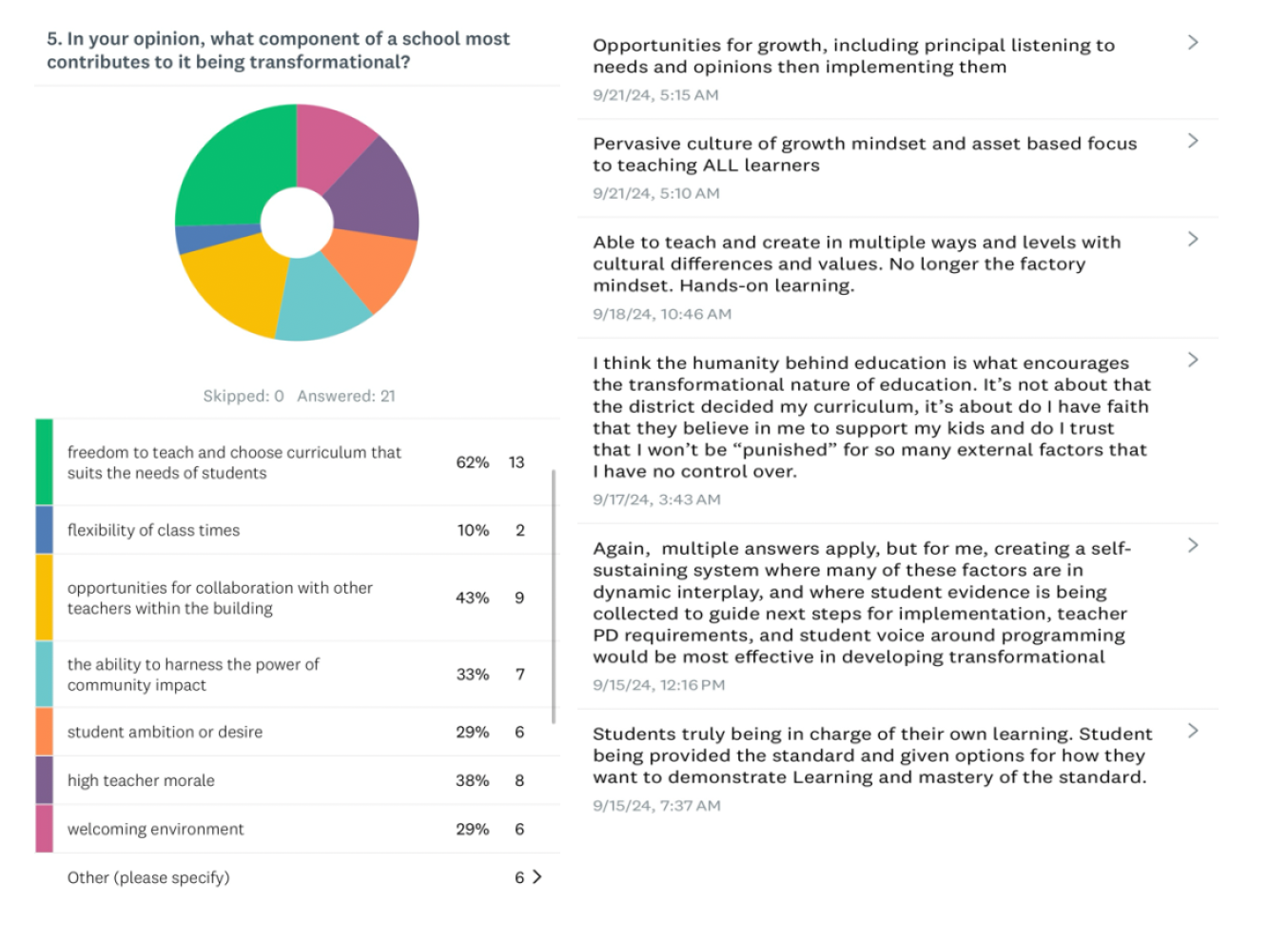The State of Things: Educators
Introduction
In a recent survey I conducted in September 2024 via Survey Monkey, educators were asked to respond to a series of questions focused on their perspectives on education. A total of 21 educators responded, including classroom teachers, education specialists, administrators, and tech integrators. The goal was to provide an opportunity to understand what education looked like from the view of those who educate. Of the 21 educators who responded, thirteen, or 61% found that education was both transactional and transformational. Four (19%) deemed education as transactional, while one (5%) saw education as transformational. Three educators sighted “other,” suggesting that education was something different than these depictions.
Education as a Transaction
It may be wise to share how the terms transactional and transformational are defined. I will reserve my definitions for later, while sharing some of the major definitions from educators. Transactional is generally characterized by “traditional direct instruction,” “kids showing up, receiving instruction and going home,” “a give and take,” “an exchange-based approach of grades or outcomes,” “sit and get,” and “conducting business.” Responding educators were asked what they feel contributes to a/their transactional view of education. Equally, 19% cited the lack of extracurricular or engaging activities and low teacher motivation. A slightly lower 14% noted that school rules and limiting policies make education feel transactional. Other responses, though no less important included: limited professional development opportunities, limited parent involvement and learning only to meet the demands of standardized testing. Five individuals who responded noted that truly all of the above, adding in micro-management, rigid schedules and uniforms contribute to the transactional vibe that education seems to display.
Transformational Nature of Education
On the other hand, transformational is noted as “developmental change,” innovative information creation,” “sparking a fire,” “different perspectives for engagement,” “growing and improving,” “critical thinking, personal growth & deeper understanding, “relevant knowledge transfer,” and “inspiration,” with many educators alluding to the word change. Respondents were able to select multiple responses for what makes education transformational, and thirteen (62%) indicated that freedom to teach and choose curriculum that fits the student need is a defining factor. Eight respondents (38%) saw high teacher morale as a characteristic of a transformational school while seven individuals (33%) identified that transformational education harnesses the power of the community. Other responses have been captured in the graphics below.
Transformational Nature of Education.
What Should Be
Interestingly, responding educators were asked whether they believed education should be transactional or transformational as a final question. Fourteen (67%) indicated transformational was their view while seven (33%) expressed that both transactional and transformational intents played a role in the education outcomes of students, teachers and schools.
Discussion
After having completed my doctoral work with Nova Southeastern University, this topic intrigued me, and I believe it can be applied in a variety of disciplines, two of which are education and theatre. I wondered, based on my dissertation topic of home visits and teacher perspectives of their influence on their attitudes, behaviors and beliefs, if there was some potential connection between the two. Moreover, I wondered if participating in home visits played a role in an educator’s view of education as transactional or transformational. Many of the educators I had the pleasure of interviewing cited the transformational nature of home visits on their attitudes about teaching, their practical behaviors as a teacher in and out the learning environment (including learning/professional development) and their self-efficacy beliefs, that they were capable of achieving a desired teaching result, as a consequence of the home visit and less cognitive dissonance.
What I can hypothesize is that the results of this educator survey identified the need for community impact as a reason why education is transformational as well as the lack of parental involvement as a reason for education being transactional. While these words both have their value, one could argue that the transformational nature of education carries a greater weight of impact than simply completing a transaction. That is not to say that transactions aren’t necessary. I liken the transaction to the the exchange of good and services between the business and the consumer. I offer money in exchange for the value of the that good or service being provided. On the other hand, the if something is transformed, I am changed – I think differently, I see differently – or I even act differently as a result of the ‘experience.’ I often see theatre, maybe movies or documentaries, stories or poems or even musical performances as examples of experiences with the capacity to transform.
While I can appreciate the views of these educators, I must beg the question, as a goal of educating others, do we seek to complete transactions or should we seek to transform, so that the ones being educated are changed instead of simply satisfied? Moreover, I find it important to note that transformation is not just something a student experiences. Sometimes, the one conveying knowledge is the one transformed. As an educator, I’d be unable to recall the number of times I have been transformed by not only continued learning but teaching. My students have been transformative. My students have and continue to inspire and my experiences with them transform me and provoke me to transform the how of teaching while remembering why I do so. Even more, as an extension of the learner, student’s families are/can be transformed by the nature of teaching and learning. One may never know all the stories, but often, the learning had by students extends beyond the immediate learning environment to the car rides and the dinner table conversations at home.

